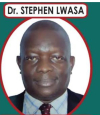Annet Namusisi Mary
ID: UNCST-2025-R017592
|
Evaluation of the Uganda Public Health Bulletin impact
REFNo: HS5978ES
1. Determine the reach of the UPHB among national, district, and international stakeholders
2. Explore how readers perceive the relevance, quality, and usefulness of the UPHB
3. Assess Content Quality Using Standardized Scorecards
4. Analyze trends in digital engagement as measured by email open rates, click-through rates, and website traffic over the past five years
5. Evaluate the impact of the UPHB on public health decision-making within 9 years of existence
|
Uganda |
2025-06-02 17:38:50 |
2028-06-02 |
Medical and Health Sciences |
Non-Clinical Trial |
Non-degree Award |

|
WALAKIRA FELIX JOSHUA
ID: UNCST-2023-R007993
|
COMMUNITY PERCEPTIONS ON HERBAL MEDICINES USE IN TREATING UPPER RESPIRATORY INFECTIONS IN KATANGA SLUM, UGANDA; A WAY OF SPARING ANTIBIOTICS.
REFNo: HS5902ES
1. To explore prevailing perceptions and beliefs within the community regarding the efficacy of herbal medicines in treating upper respiratory infections.
2. To explore the perceived barriers and facilitators to the adoption of herbal medicines in treating Upper Respiratory Infections as a means of sparing antibiotics.
3. To determine the proportion of people in Katanga who have suffered from Upper Respiratory Infections.
|
Uganda |
2025-06-02 17:37:03 |
2028-06-02 |
Medical and Health Sciences |
Non-Clinical Trial |
Non-degree Award |
 (4).jpg)
|
Holly Parsons Jane Emily
ID: UNCST-2024-R002678
|
Case Study: Exploring the Effectiveness of Village Health Teams in Uganda's 12 Refugee-Hosting District
REFNo: SS3874ES
The main objective on this research is to drive the narrative on a successful method of transition from humanitarian-funded to government ownership of health systems for refugees in low- and middle-income countries that depends on responsibility-sharing as part of the Global Compact on Refugees. The specific objective is to explore the effectiveness of Village Health Teams (VHTs) in Uganda's 12 refugee-hosting districts in preventing and treating human malaria by identifying key successes and key challenges of this health system, and then exploring how successes can be proliferated and how challenges can be mitigated.
|
Canada |
2025-06-02 17:20:52 |
2028-06-02 |
Social Science and Humanities |
Non-Clinical Trial |
Degree Award |

|
Amon Tayebwa
ID: UNCST-2024-R002098
|
THE ANATOMICAL VARIATIONS AND DISTRIBUTION OF THE HUMAN CORONARY ARTERIES: A CADAVERIC STUDY AT MBARARA REGIONAL REFERRAL HOSPITAL IN SOUTH WESTERN UGANDA.
REFNo: HS6003ES
1.What are the different branching and dominance patterns of the human coronary arteries amongst unclaimed bodies at Mbarara Regional Referral Hospital?
2.What are the different patterns of origin of coronary arteries at the sinotubular junction amongst unclaimed bodies at Mbarara Regional Referral Hospital?
|
Uganda |
2025-06-02 17:17:36 |
2028-06-02 |
Medical and Health Sciences |
Non-Clinical Trial |
Degree Award |

|
Gloria Naome Aduku
ID: UNCST-2024-R015930
|
IMPACT OF ANTHROPOGENIC ACTIVITIES (TOURISM) AND PARASITISM ON PHYSIOLOGIAL STRESS IN GORILLAS (Gorilla beringei beringei) IN BWINDI IMPENETRABLE NATIONAL PARK
REFNo: NS971ES
• To evaluate six different Enzyme Immunoassays (EIA) for quantifying fGCMs in mountain gorillas.
• To investigate the effect of bacterial metabolism and environmental factors on the stability of faecal glucocorticoid metabolite (fGCM) concentrations post-defaecation
• To examine variation in parasitic burden and fGCM concentrations of spatially separated mountain gorilla groups.
• To examine parasitic burden and fGCM concentrations of mountain gorillas during high and low tourism activity.
• To identify specific parasitic infections that correlate with elevated fGCM concentrations in mountain gorillas.
|
Uganda |
2025-06-02 17:16:50 |
2028-06-02 |
Natural Sciences |
Non-Clinical Trial |
Degree Award |

|
AHEEBWA ROGGERS COLLINS
ID: UNCST-2025-R017036
|
Tax Policies And Financial Performance Of Small & Medium Enterprises (SMEs) in Uganda: A Case Of SMEs
in Kabale District
REFNo: SS3844ES
i. To examine the effect of tax compliance costs on the financial performance of small and medium enterprises in Kabale district
ii. To examine the effect of tax incentives on the financial performance of small and medium enterprises in Kabale district.
iii. To examine the effect of tax rates on the financial performance of small scale and medium enterprises in Kabale district.
|
Uganda |
2025-06-02 17:15:52 |
2028-06-02 |
Social Science and Humanities |
Non-Clinical Trial |
Degree Award |

|
Kamya Moses
ID: UNCST-2020-R014203
|
A case-control study to assess the effectiveness and safety of the R21/matrix-M malaria vaccine
REFNo: HS6009ES
To assess the Vaccine Effectiveness (VE) of R21/Matrix-M vaccine against severe malaria caused by Plasmodium falciparum.
To assess the Vaccine Effectiveness (VE) of the R21/Matrix-M vaccine against clinical malaria in high-transmission perennial areas caused by Plasmodium falciparum.
To assess if the R21/Matrix-M vaccine recipients are at an increased risk of death (all-cause).
|
Uganda |
2025-06-02 17:04:40 |
2028-06-02 |
Medical and Health Sciences |
Non-Clinical Trial |
Non-degree Award |

|
Isaac Ssewanyana
ID: UNCST-2020-R014336
|
PROTOCOL FOR THE PERFORMANCE EVALUATION OF ALINITY M HIV-1 ASSAY USING DRIED BLOOD SPOT SPECIMENS HIV VIRAL LOAD ASSAY FOR WHO PREQUALIFICATION ASSESSMENT
REFNo: HS6061ES
• To assess the Alinity m HIV-1 DBS assay’s agreement with a cobas HIV-1 Quantitative nucleic acid test for use on the cobas 6800/8800 Systems (Roche Diagnostics GmbH) on clinical specimens, including:
o Quantitative assessment of bias, limits of agreement and correlation
o Misclassification above or below the clinical threshold (1000 copies/mL)
• To assess the analytical performance of the Alinity m HIV-1 assay using DBS:
o Precision (repeatability and within-laboratory reproducibility)
o Linear range on the main subtypes
o Limit of detection
o Cross-contamination
• To describe the operational characteristics and ease of use of the Alinity m HIV-1 assay using DBS and its suitability for use in countries with limited infrastructure.
|
Uganda |
2025-05-29 17:20:17 |
2028-05-29 |
Medical and Health Sciences |
Non-Clinical Trial |
Non-degree Award |

|
Isaac Ssewanyana
ID: UNCST-2020-R014336
|
STANDARDTM M10 HR-HPV: Evaluation of Clinical Performance and Usability in the hands of untrained users.
REFNo: HS6022ES
Demonstration of usability of the STANDARDTM M10 Hr-HPV assay. ,Demonstration of sample type equivalence for the STANDARDTM M10 Hr-HPV assay: ThinPrep® PreservCyt® Solution (Hologic) vs. BD SurePathTM Collection Vial (Becton, Dickinson and Company),Determination of the relative diagnostic sensitivity and specificity i.e. compared with the Roche Cobas HPV assay (used according to the current standard of care at the study site).,Determination of clinical accuracy i.e. absolute diagnostic sensitivity for CIN2+ and CIN3+ and absolute diagnostic specificity for ≤ CIN1.,To demonstrate the clinical performance of the STANDARDTM M10 Hr-HPV assay when used by healthcare professionals in a laboratory setting or health institution (i.e. intended use setting), the following objectives have been defined.,
|
Uganda |
2025-05-29 17:19:03 |
2028-05-29 |
Medical and Health Sciences |
Non-Clinical Trial |
Non-degree Award |

|
Anatoli Mawanda
ID: UNCST-2024-R015927
|
GENETIC AND MOLECULAR DETERMINANTS OF BREAST CANCER
DISPARITY AMONG AFRICAN, AFRICAN AMERICAN AND WHITE
POPULATIONS
REFNo: HS6015ES
To study the genetic, molecular, and biological regulators of breast cancer in Ugandan
women and compare them with African American and white women.
|
Uganda |
2025-05-29 17:17:31 |
2028-05-29 |
Medical and Health Sciences |
Non-Clinical Trial |
Non-degree Award |

|
Christabel Gero Anyango
ID: UNCST-2025-R017108
|
Perspectives of Child Domestic Workers and Their Employers: A Qualitative Study in Kampala, Uganda
REFNo: SS3860ES
• To establish patterns of entry into, exit out of and conditions of child domestic work in the Ugandan setting, including patterns that constitute human trafficking. Entry patterns will include decision making and influences to enter domestic work, while exit will encompass strategies used to transition to other work roles and the types of work roles entered following domestic work.
• To understand employers’ perceptions of and views on child domestic workers, including reasons for recruiting younger workers, strategies to recruit CDWs, views on the benefits, drawbacks and development needs of younger workers, treatment and remuneration of CDWs, and awareness of laws and policies related to young workers, among others.
|
Kenya |
2025-05-29 17:15:05 |
2028-05-29 |
Social Science and Humanities |
Non-Clinical Trial |
Non-degree Award |

|
Jeya Sushimitha Jawahar Kanth
ID: UNCST-2024-R016269
|
Evaluating the Impact of Social Media Influencers on Tobacco Use Among Urban Youth in Africa: A Comparative Mixed Methods Study Across Kampala, Nairobi, and Lagos
REFNo: SS3850ES
Main Objective
1. To explore and compare the role of social media influencers in shaping tobacco use behaviors among urban youth (ages 18-29) residing in Kampala, Nairobi, and Lagos by examining tobacco use prevalence, influencer messaging, and youth perspectives.
Specific Objectives
1. To determine the prevalence of tobacco use among urban youth (18-29 years) in Nairobi, Lagos, and Kampala.
2. To assess the relationship between exposure to influencer content and tobacco use behaviors among urban youth.
3. To analyze the content and reach of pro-tobacco messages shared by social media influencers among the target youth population.
4. To investigate urban youth perceptions of how influencers impact their decisions and attitudes toward tobacco use.
|
India |
2025-05-29 17:14:22 |
2028-05-29 |
Social Science and Humanities |
Non-Clinical Trial |
Non-degree Award |

|
Denis Nansera
ID: UNCST-2024-R004002
|
Improving HIV testing among Children under five in Rural Uganda
REFNo: HS5829ES
The main objective of this study is to develop a traditional healer facilitated paediatric HIV testing program to improve access to paediatric HIV testing. To do this, we will first use qualitative study methods to determine factors that influence HIV testing among paediatric clients of TH and guide adaptation of the TH-facilitated HIV testing program for children. We will then implement a pilot study to evaluate offering paediatric HIV testing at traditional healer locations in southwestern Uganda.
|
Uganda |
2025-05-29 17:12:49 |
2028-05-29 |
Medical and Health Sciences |
Clinical Trial |
Non-degree Award |

|
Nanyonga Elizabeth Monica
ID: UNCST-2025-R018232
|
srd
REFNo: SIR516ES
GGGGGGGGGGGGGGGGGGGGGGGGGGGG
|
Uganda |
2025-05-27 9:30:38 |
2028-05-27 |
Engineering and Technology |
Clinical Trial |
Non-degree Award |

|
Justine Komunyena Tumusiime
ID: UNCST-2023-R008465
|
“Exploring Acceptability: Expanding Family Planning Services in Pharmacies and drug shops in Uganda.”
REFNo: HS5733ES
a. To assess the acceptability of family planning including implant provision through pharmacies and drug shops among key stakeholders in Uganda.
b. To examine the role of non-monetary incentives (e.g., training, certification, recognition) in motivating pharmacy and drug shop operators to provide FP services.
c. To explore the willingness and capacity of pharmacy and drug shop providers to comply with government reporting requirements for FP service provision.
d. To identify perceived potential facilitators and challenges to the successful implementation of implant provision in pharmacies and drug shops in Uganda.
|
Uganda |
2025-05-27 11:03:29 |
2028-05-27 |
Medical and Health Sciences |
Non-Clinical Trial |
Non-degree Award |

|
Martina Ferracane Francesca
ID: UNCST-2025-R016796
|
Assessing the digital trade rules in Rwanda and Uganda
REFNo: SS3942ES
Main Objective
1. Address the knowledge gap between Uganda’s current legal framework and its potential enabling or restrictive impact on digital trade development, ensuring that policy initiatives and policy framework align with the needs of businesses engaging in digital trade.
Specific Objectives
1. Identify the challenges faced by private sector entities, including SMEs and start-ups, in digital trade.
2. Provide actionable policy recommendations to improve Uganda’s digital trade framework.
3. Assess the existing digital trade policies in Uganda and identify areas for improvement.
|
Italy |
2025-05-23 8:20:18 |
2028-05-23 |
Social Science and Humanities |
Non-Clinical Trial |
Non-degree Award |

|
Stephen Lwasa
ID: UNCST-2025-R018323
|
Value Chain Study and Market Assessment Farmer Managed Natural Regeneration (FMNR) Catalyst Project
REFNo: A607ES
The main objective of the value chain and market analysis was to identify complementary livelihood options or enterprises in FMNR project implementation areas that can be established in the demonstration and learning sites.
|
Uganda |
2025-05-23 14:12:56 |
2028-05-23 |
Agricultural Sciences |
Non-Clinical Trial |
Non-degree Award |

|
DARIUS OWACHI
ID: UNCST-2022-R009373
|
Impact of Antimicrobial Stewardship Interventions on Healthcare Workers’ Antibiotic Prescription Patterns and Compliance with Standard Treatment Guidelines at Kiruddu Hospital; A Quality Improvement Study.
REFNo: HS5989ES
To assess the impact of antimicrobial stewardship interventions on the knowledge levels, antibiotic prescription patterns and compliance to standard treatment guidelines, by healthcare workers at Kiruddu National Referral hospital through quality improvement methods. ,
|
Uganda |
2025-05-23 14:10:37 |
2028-05-23 |
Medical and Health Sciences |
Non-Clinical Trial |
Non-degree Award |
.jpg)
|
Violet Gwokyalya
ID: UNCST-2022-R010490
|
Drivers of under-prescription of cervical cancer screening: evidence from Uganda
REFNo: HS5957ES
Main Objective
1. To quantify the drivers of under-prescription of cervical cancer screening among providers of routine care in Uganda
________________________________________
Specific Objectives
1. To evaluate whether providers lack knowledge of recommended cervical cancer screening practices
2. To identify patient characteristics that predict screening recommendation for cervical cancer.
3. To evaluate whether providers with appropriate knowledge of cervical cancer screening recommend screening to their clients (i.e., whether a know-do gap exists).
|
Uganda |
2025-05-23 14:05:07 |
2028-05-23 |
Medical and Health Sciences |
Non-Clinical Trial |
Non-degree Award |

|
Sheila Balinda Nina
ID: UNCST-2021-R013804
|
Analysing HIV-1 Reservoir Kinetics, and Host Immune Interactions among non-B subtypes.
REFNo: HS5936ES
General Objective
To understand the dynamics of HIV-1 reservoirs and host immune interactions among non-B subtypes infected participants in Uganda.
Specific objectives:
1. To compare the dimensions of the HIV-1 reservoir among Ugandans, including individuals with high viral loads at the start of ART, and those who have been on ART for varying durations.
2. To detect HIV-1 viral properties associated with latent reservoirs across HIV-subtypes, examining how these patterns may differ and contribute to disparities in reactivation tendencies in Uganda.
3. To detect immune correlates in relation to host characteristics, including HIV-1 specific, B-cells, innate immune cells, CD4 and CD8 cell lineage activation, and exhaustion markers.
4. To develop a supervised machine learning algorithm to predict the HIV-1 latent reservoir behaviours in Uganda.
|
Uganda |
2025-05-23 14:00:42 |
2028-05-23 |
Medical and Health Sciences |
Non-Clinical Trial |
Non-degree Award |

|
| View |
|
Sort By: |
|
|
|
| |
|